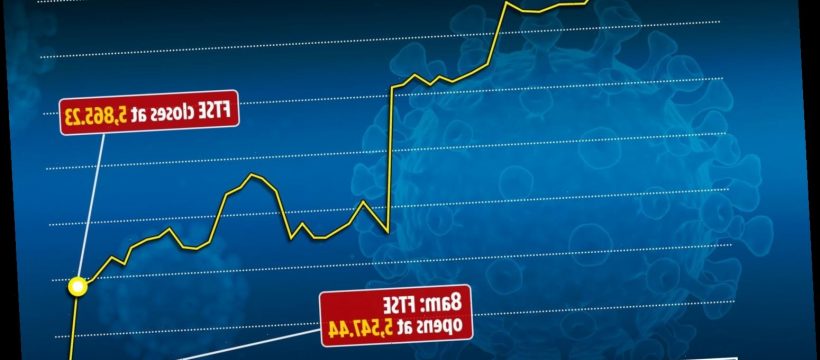THE FTSE 100 has plunged 10 per cent in the worst day since "Black Monday" in 1987 after the World Health Organisation (WHO) declared the coronavirus a pandemic.
The crash has wiped nearly £150billion off shares of Britain's biggest companies.
⚠️ Read our coronavirus live blog for the latest news & updates
During the "Black Monday" crash of October 1987, the FTSE 100 fell 11 per cent and then 12 per cent on consecutive days.
It comes as there are now more than 129,000 cases of Covid-19 in 114 countries around the world and 4,751 people have died.
Yesterday, WHO Director-General Dr Tedros Adhanom Ghebreyesus said the number of cases outside China had increased 13-fold over the past two weeks.
He said he was "deeply concerned" by "alarming levels of inaction" over the virus.
He added: "We have therefore made the assessment that Covid 19 can be characterised as a pandemic."
The WHO defines a pandemic as the worldwide spread of a new disease.

At the time of close at 4.30pm today, the FTSE 100 index of Britain’s biggest companies was 576.68 points down.
The index fell 6 per cent in the first hour of trading, wiping £84billion off the value of shares.
It then dropped even further when the markets opened down in the US, before closing at 5,299.84 – 9.81 per cent down.
When the coronavirus first appeared in China on December 31, the FTSE 100 closed at 7,587.
The crash comes after Donald Trump last night announced that he'll suspend all flights to the US from Europe except the UK and Ireland for the next 30 days due to coronavirus.
The President said the European Union "failed to take the same precautions" as the US before announcing the travel restrictions – which will go into effect on Friday at 12am.
How the FTSE 100 falling affects your personal finances
FALLS in the stock market can affect your finances in a number of ways, here we explain how.
Pensions – If you save cash into a pension scheme where the provider invests your money, you'll likely see the value of your pension drop when the FTSE 100 falls.
But keep in mind that with retirement savings, you’re investing for the long-term so the drop in value isn’t likely to be permanent.
Instead, you’ll see your retirement savings grow again once the stock market recovers.
Savings and mortgages – There is no direct link between the stock market and your mortgage or savings accounts.
But if panic on the stock market spreads to the wider economy, the Bank of England may cut interest rates – and it did so yesterday.
This means your mortgage is likely to get cheaper, while savers will suffer from lower interest rates.
We’ve explained how the interest rate cut will affect your finances here.
Sterling – The value of the pound often rises if the FTSE 100 falls, as many of the big firms on the index earns significant amount of cash in the US.
But this hasn't been the case today as markets around the world are in "panic mode", said Jeremy Thomson Cook, chief economist of Equals, leading sterling to drop against the dollar too.
He added: "Sterling is caught in the middle; a currency that has lost its haven status courtesy of Brexit while investors hold dollars as the global reserve currency."
Jasper Lawler, head of research at investment service LCG, said: "The travel ban is a decisive step to prevent the spread in the US but will cripple trade between the two continents.
"Goods will still flow but presumably at reduced pace and trade in services will almost grind to a halt."
But others were less impressed, pointing out how the mixed messages will continue to worry investors.
Neil Wilson, chief market analyst, at Markets.com said: "So much for Trump's stimulus.
"Instead of his late-night presidential address calming things, it only fanned the flames raging in markets.
"The president has gone from calling it a Democrat hoax to banning all travel from Europe in just 12 days."
The FTSE 100 index has had a turbulent time recently, closing 7.7 per cent down on Monday after Saudi Arabia launched an oil price war.
Around £144billion was lost on the stock markets — slashing the pensions and savings of millions on what was dubbed Black Death Monday.
But despite being the worst plunge since 2008, it then opened 3 per cent up on Tuesday.
Investors fear the impact of measures taken by countries to stop the spread of the virus, such as shutting factories and schools, will have a huge negative impact on the global economy.
A number of airlines have also taken an economic hit as holidaymakers ditch flying abroad to countries where the outbreak is prevalent, such as Italy, to stay at home instead.
Earlier this week, Qantas cut nearly a third of all flights, while Flybe airline even called in administrators last week.
Supermarkets have also been impacted by the outbreak of the virus, with shoppers clearing shelves amid panic buying and stockpiling chaos.
While the Bank of England yesterday slashed the base interest rate by 0.5 percentage points.
Source: Read Full Article

